This summer, seven undergraduate engineering students from the University of Rhode Island will spend 10 weeks conducting intensive research under the tutelage of a mentor.
The Summer Undergraduate Research Fellowship (SURF) offers students hands-on experience on current research projects, while receiving valuable instruction and feedback from faculty and graduate students.
The seven URI students are among 32 participants from eight Rhode Island institutions. The program runs from May 24 to July 30.
Paige Barbera
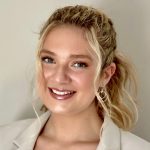
rising senior, chemical engineering, Newburgh, NY
Project: “Developing a graphene liquid cell for electron microscopy”
Mentor: Arijit Bose, University of Rhode Island
Co-Mentor: Irene Andreu, University of Rhode Island
I’ll be using an atomic force microscope to understand how microplastics interact with cyanobacteria. This research could have a positive effect on the marine environment. The hands-on skills I’m acquiring in the lab will also help me achieve my career goal of developing innovative and safe makeup products, hair products or fragrance products for a cosmetics company. – Paige Barbera
Caroline Canales
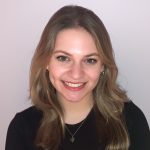
rising junior, chemical engineering, Neptune, NJ
Project: “Characterization of biological nanoparticles generated by bacteria in Narragansett Bay”
Mentor: Zachary Shepard, University of Rhode Island
Co-Mentor: Vinka Craver, University of Rhode Island
Co-Mentor: Irene Andreu, University of Rhode Island
I have always wanted to explore the biological side of chemical engineering in a lab. I’m using a continuous culture technique to grow bacteria that can produce manganese oxide nanoparticles, which can be used in water treatment to absorb metals and organic compounds. – Caroline Canales
Caroline will be heavily involved with the culturing process. By the end of the summer she will have considerable experience with Applikon bioreactors, the theory and practical application of continuous culture techniques, and the laboratory skills involved with culturing microorganisms. – Zachary Shepard
Megan Capwell
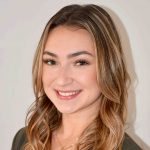
rising senior, chemical engineering, Hope Valley, RI
Project: “Interaction of microplastics with marine bacteria: the good and the bad”
Mentor: Arijit Bose, University of Rhode Island
Co-Mentor: Tania Silva de Oliveira, University of Rhode Island
I’ll observe the biological effects microplastics have on marine bacteria and make a contribution to the research on this subject, which has been ongoing at URI. The lab experience I’ll gain will help prepare me for my goal of having a career in the pharmaceutical or cosmetics industry. – Megan Capwell
Megan Capwell and Paige Barbera will conduct research on a meaningful problem – the deleterious impact of microplastics on the ocean ecosystem. I’ll encourage them to think independently, ask lots of questions and use their intuition and learning to contribute toward a new understanding of the problem, its effects, and suggest potential mitigation strategies. – Arijit Bose
Ciara French
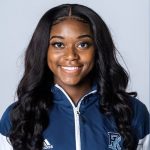
rising senior, biomedical engineering, Maplewood, NJ
Project: “What’s the story? Developing engaging narratives to communicate scientific research”
Mentor: Shaun Kirby, University of Rhode Island
Project Description: Although scientists themselves often take on the role of communicating research, there remains a need for individuals from other professions, namely journalism and education, to know how to effectively communicate science through media and techniques not prioritized within academia. The student will identify a research topic and develop an engaging communication project that can effectively convey its science and current or potential impact on target stakeholders.
Sean Lane
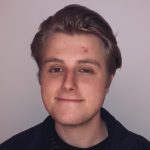
rising senior, ocean engineering, Marshfield, MA
Project: “Exploring autonomous underwater vehicles usage in Narragansett Bay observation”
Mentor: Mingxi Zhou, University of Rhode Island
I’m designing and assembling a camera system for autonomous underwater vehicles and remotely operated vehicles. This practical application of ocean engineering with respect to robotics is extremely important experience for my career. – Sean Lane
Sean is building a smart underwater camera system, to not only collect imagery of the seabed, but also provide data to help autonomous underwater vehicles navigate underwater without GPS. – Mingxi Zhou
Sokpearoun Lorn
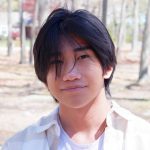
rising sophomore, computer engineering, Riverside, RI
Project: “Data for forecasting Rhode Island waterways”
Mentor: Baylor Fox-Kemper, Brown University
I’m using drones to map surface current velocities in Rhode Island waterways. This research experience will develop my knowledge of MATLAB and Python. I’m glad to have the support of my mentor and peers, especially since this is my first time working on a research project. – Sokpearoun Lorn
The goal of an undergraduate research project is to experience a cycle of feelings: curiosity, then some discomfort, then the effort of pushing through, then a eureka! moment or two when something works, and finally, to feel what it is like to be clever at getting things done and to be acknowledged for it. – Baylor Fox-Kemper
David Nadeau
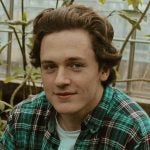
rising senior, ocean engineering, Warwick, RI
Project: “Real-time monitoring of Narragansett Bay utilizing remote sensing and sampling platforms”
Mentor: Kristofer Gomes, University of Rhode Island
Co-Mentor: Andrew Davies, University of Rhode Island
By utilizing two remotely operated buoy systems, as well as incorporating the Castle Hill lighthouse pump station, we’ll collect data from Narragansett Bay, such as nutrient levels, salinity, temperature, and filtered samples, which will be used to predict how fluctuations of environmental factors influence the community of phytoplankton. This project will allow me to apply my skills to answer questions that have previously been outside of my scope. – David Nadeau
During our time working together I hope to give David the tools and experience necessary to analyze and interpret oceanographic measurements, including physical, chemical, and biological data collected by the types of sensors and remote samplers that he may find himself designing in his career. – Kristofer Gomes
